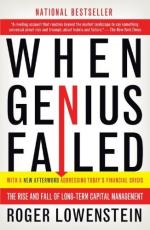
|
| Name: _________________________ | Period: ___________________ |
This test consists of 15 multiple choice questions and 5 short answer questions.
Multiple Choice Questions
1. What did the traders accept about the financial models they used?
(a) They were smarter than humans.
(b) They were imperfect.
(c) They were expensive.
(d) They removed the element of surprise.
2. How much did Long-Term plan to take from its profits?
(a) 15%.
(b) 25%.
(c) 10%.
(d) 30%.
3. What notable company went bankrupt in the 1970's?
(a) Penn Weapons Industry.
(b) Penn Central Railroad.
(c) Penn North Distillery.
(d) Penn Coal.
4. How much did Long-Term earn in its first year of operation?
(a) 28%.
(b) 5%.
(c) 10%.
(d) 75%.
5. Who ran the London office for Long-Term?
(a) Buffet.
(b) Meriwether.
(c) Haghani.
(d) Mullins.
6. How much did the accounts for investors increase in 1994?
(a) 50%.
(b) 10%.
(c) 20%.
(d) 5%.
7. What unusual event happened when Meriwether began working with Treasury futures?
(a) The U.S. government collapsed.
(b) The price fell.
(c) He lost millions.
(d) The price rose.
8. What did Black and Scholes use to calculate market change?
(a) History.
(b) Calculus and computer models.
(c) In depth financial patterns.
(d) Meriwether's advice.
9. What was J.F. Eckstein & Co. primarily working on in 1979?
(a) Bonds.
(b) IO's.
(c) Treasury Bill futures.
(d) Stocks.
10. Who charged Long-Term much lower fees than other clients?
(a) NYSE.
(b) The Federal Reserve.
(c) The hospitality industry.
(d) Brokerage firms.
11. Meriwether believed that risk and volatility were what?
(a) A part of life.
(b) Unmanagable.
(c) Quantifiable.
(d) Abstract ideas.
12. How much money did Long-Term earn in 1996?
(a) $500 million.
(b) $100 million.
(c) $1 billion.
(d) $2.1 billion.
13. In order for Meriwether's Treasury futures investment to work, what did he need market prices to do?
(a) Fluctuate drastically.
(b) Converge.
(c) Remain the same.
(d) None of these.
14. What did Long-Term want to do for investors?
(a) Make money.
(b) Limit risk.
(c) All of these.
(d) Build trust.
15. What year did Meriwether hire Myron Scholes?
(a) 1996.
(b) 1993.
(c) 1994.
(d) 1995.
Short Answer Questions
1. What were the models Long-Term used unable to predict?
2. In 1996, what was the second bank Long-Term approached about financing their credit?
3. In 1994, what market did Long-Term begin to express an interest in?
4. What happened to Meriwether's Treasury bill deal before it was resolved?
5. In 1996, Long-Term was four times as large as what?
|
This section contains 353 words (approx. 2 pages at 300 words per page) |

|




